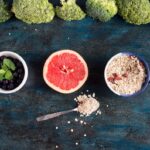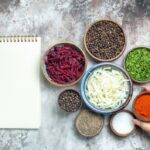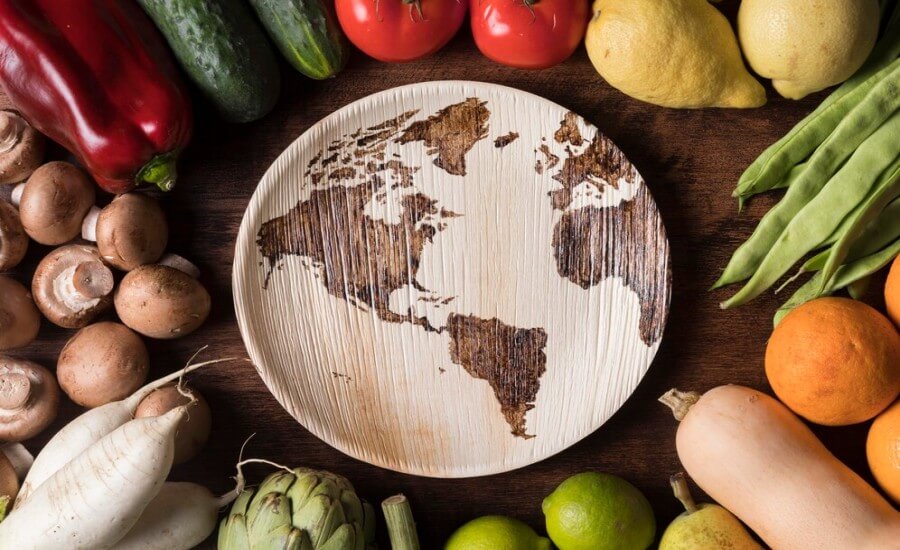Fast food is an undeniable part of modern urban life in India, including cities like Vadodara. For the growing number of vegans, navigating these Quick Service Restaurants (QSRs) presents a unique challenge, distinct even from the vegetarian experience India caters to so well. Is grabbing a quick vegan bite at a drive-thru or food court a feasible dream or a frustrating mirage? This analysis dives into the reality of “Vegan Fast Food India” in 2025. We scrutinize the options (or lack thereof), the nutritional implications, ethical considerations, environmental footprint, practical hurdles, and cultural context.
While technically possible at some chains with careful maneuvering, the landscape is dominated by modification, potential hidden animal products, cross-contamination risks, and a significant gap compared to global vegan fast-food advancements. This 360° reality check aims to equip Indian vegans with the knowledge needed to navigate this complex terrain.
LENS 1: Nutritional Analysis – The Hidden Costs of Convenience
- Key Findings: Vegan options secured through modification at Indian QSRs often fall into nutritional pitfalls common to all fast food: high sodium, refined carbohydrates, potentially unhealthy fats, and low fiber/micronutrient density. While avoiding cholesterol and potentially saturated fat (vs. meat options), they are rarely “health foods“.
- Detailed Analysis:
- What’s Available?: Modified vegetarian burgers (like a McAloo Tikki without mayo), cheeseless vegetable pizzas, or specific Subway combinations often rely on fried patties (aloo tikki, hara bhara kebab), refined flour buns/crusts, sugary sauces, and limited fresh vegetables (lettuce, tomato, onion).
- Nutritional Pitfalls: Sodium levels can be extremely high in patties, sauces, and processed ingredients. Refined buns and pizza bases offer little fiber. Frying oils (even if vegetable-based) contribute significant calories and potentially less healthy fats depending on oil type and maintenance. Portion sizes can encourage overconsumption.
- Potential Positives: Compared to their non-vegan counterparts, these options are cholesterol-free and likely lower in saturated fat. However, this doesn’t automatically make them healthy.
- Nutritional Deep Dive: Decoding the Modified Order: Let’s consider a hypothetical customized McAloo Tikki (no mayo, potentially different bun if needed). The patty itself is primarily potato and peas, often bound with refined flour and fried. The bun is typically refined white flour. The primary nutrients are carbohydrates and fat from frying. Fiber is minimal. Sodium is likely high. A Subway Veggie Delite on white bread with select sauces offers more vegetables but still relies on refined bread and potentially sugary/salty sauces. Achieving a balanced, nutrient-dense meal is challenging.
- What’s Available?: Modified vegetarian burgers (like a McAloo Tikki without mayo), cheeseless vegetable pizzas, or specific Subway combinations often rely on fried patties (aloo tikki, hara bhara kebab), refined flour buns/crusts, sugary sauces, and limited fresh vegetables (lettuce, tomato, onion).
- Voice of Experience (Indian Dietitian): “Clients often ask about vegan fast food. While options exist if you modify, they are usually processed, high-sodium choices. It’s okay for an occasional meal, but shouldn’t be a staple. Prioritizing whole foods is always better. If choosing fast food, load up on any available fresh veggies, choose simpler sauces like mustard (if vegan), and skip the sugary drinks.” – Priya Desai, RD (Vadodara).
- Critical Reassessment: The allure of “vegan” fast food can create a health halo. It’s crucial to recognize these are still ultra-processed foods, and their vegan status doesn’t negate the need for moderation.
LENS 2: Ethical Framework – Compromises and Visibility
- Key Findings: Choosing modified vegan options at mainstream QSRs presents an ethical dilemma. While it avoids direct consumption of animal products in that meal, it supports corporations heavily invested in animal agriculture. Cross-contamination risks also challenge strict adherence. However, it increases vegan visibility and signals demand.
- Detailed Analysis:
- Supporting the System?: Purchasing from chains like McDonald’s or KFC, even vegan items, contributes financially to companies whose primary business involves animal slaughter on a massive scale. Some ethical vegans avoid these establishments entirely.
- Signaling Demand & Normalization: Others argue that ordering vegan options, even modified ones, demonstrates market demand, potentially encouraging chains to offer more (and better) dedicated vegan items in the future. It normalizes veganism by making it visible in mainstream spaces.
- Cross-Contamination Concerns: For vegans avoiding animal products for strict ethical reasons (or allergies), the high risk of cross-contamination from shared grills, fryers, utensils, and handling procedures in a busy, non-vegan kitchen is a significant issue. FSSAI regulations (2022) mandate prevention for certified vegan products, but standard QSR items lack this assurance.
- Hidden Ingredients: The ethical issue of unknowingly consuming trace animal products due to unclear labeling or errors during modification is also pertinent.
- Supporting the System?: Purchasing from chains like McDonald’s or KFC, even vegan items, contributes financially to companies whose primary business involves animal slaughter on a massive scale. Some ethical vegans avoid these establishments entirely.
- Hidden Benefit: Each time someone successfully orders a vegan meal at a major QSR, it can spark curiosity or conversation, contributing incrementally to broader awareness and normalization of plant-based eating.
- Alternative Approaches: Supporting fully vegan local restaurants or cafes (increasingly present in cities like Vadodara), or choosing naturally vegan street food (after careful verification) offers ethically clearer choices.
LENS 3: Environmental Scientist’s Analysis – A Lighter Footprint, Still Packaged
- Key Findings: Vegan fast-food options, even processed ones, generally have a lower environmental footprint (GHG emissions, land use, water use) than their meat or dairy counterparts. However, the pervasive issue of excessive single-use packaging significantly undermines the overall environmental benefit of choosing fast food.
- Detailed Analysis:
- Ingredient Footprint: Plant-based ingredients like potatoes, peas, wheat, and vegetables used in vegan QSR items require significantly fewer resources and generate fewer emissions than raising beef, chicken, or dairy cattle. Replacing a chicken or beef burger with a modified veg burger demonstrably lowers the meal’s carbon footprint.
- The Packaging Problem: Fast food, regardless of ingredients, generates enormous amounts of waste – wrappers, boxes, cups, lids, straws, condiment packets. This single-use plastic and paper waste contributes to landfill burden, pollution, and resource depletion. The environmental benefit of the vegan ingredients is partially offset by the packaging impact.
- Supply Chain Scale: Sourcing ingredients consistently and affordably for thousands of QSR outlets involves large-scale agriculture, which can have its own environmental issues (monocropping, transportation) even if plant-based.
- Ingredient Footprint: Plant-based ingredients like potatoes, peas, wheat, and vegetables used in vegan QSR items require significantly fewer resources and generate fewer emissions than raising beef, chicken, or dairy cattle. Replacing a chicken or beef burger with a modified veg burger demonstrably lowers the meal’s carbon footprint.
- Voice of Experience (Environmental Advocate): “Choosing the plant-based option at a QSR is definitely a better choice for the planet than the meat version, ingredient-wise. But we can’t ignore the packaging disaster. True sustainable eating involves reducing reliance on single-use items, which fast food inherently promotes.” – Ravi Sharma, Sustainability Consultant.
LENS 4: Everyday Practitioner’s Experience – The Navigation Maze
- Key Findings: Successfully ordering vegan fast food in India (as of 2025) requires specific knowledge, clear communication, patience, and acceptance of limitations and risks. It’s rarely straightforward.
- Detailed Analysis: Chain-Specific Guide (India, 2025 – Subject to Change & Location):
- McDonald’s India: High risk. McAloo Tikki/Veggie Burger patties might be vegan, but often contain dairy/other binders (needs verification). Mayo is standard (request removal). Buns may contain dairy (request ingredient info if possible, often difficult). Fries might be cooked in dedicated veg oil, but cross-contamination risk exists. Drinks generally safe. Limited reliable options.
- Burger King India: Veggie patties exist (BK Veggie, Veg Whopper patty), but composition needs checking for dairy/egg. Standard mayo needs removal. Bun ingredients require checking. Fries/Onion Rings might be vegan (PETA suggests for US), but verify Indian practices regarding shared fryers. Limited reliable options.
- Subway India: Most promising potential. Choose breads carefully (Italian White, Wheat likely safe; avoid Honey Oat; check others). Opt for Veggie Delite or specific veg patties (Hara Bhara Kebab, Corn & Pea – verify patty ingredients). Crucially, choose vegan sauces (Oil, Vinegar, Mustard, potentially BBQ/Hot Sauce – AVOID mayo, creamy sauces, Honey Mustard, Sweet Onion). Explicitly ask for NO cheese. High customization potential, but relies on staff attentiveness and knowledge. Cross-contamination on cutting boards/knives possible.
- Domino’s/Pizza Hut India: Order a standard vegetable pizza with NO cheese. Confirm crust and tomato sauce are vegan (usually are). Limited option, but generally reliable if cheeseless. No widely available vegan cheese alternative in major chains yet (as of early 2025).
- Taco Bell India: Difficult. Pinto beans might be vegan (confirm no lard/dairy). Order bean tacos/burritos ‘Fresco Style’ (removes cheese/sour cream). Avoid items explicitly containing paneer or cheese sauces. Need clear communication.
- KFC India: Very limited. Veg burgers almost certainly contain dairy/egg. Fries might be vegan if cooked separately. Drinks are the safest bet.
- Local Vadodara Chains/Street Food: Requires direct inquiry. Sev Usal, Samosa, Kachori can be vegan if made with oil (not ghee) and no dairy in fillings. Pav Bhaji/Dabeli usually contain butter (request oil preparation), and pav (buns) often contains milk solids (verify). Pani Puri, Bhel Puri often vegan (check chutneys, avoid curd/dahi).
- Communication & Risk: Clearly state “No dairy, no milk, no ghee, no butter, no cheese, no paneer, no dahi, no honey, no egg”. Specify sauce removals/substitutions. Be prepared for misunderstandings or lack of awareness from staff. Accept the inherent risk of errors and cross-contamination in non-dedicated kitchens.
- McDonald’s India: High risk. McAloo Tikki/Veggie Burger patties might be vegan, but often contain dairy/other binders (needs verification). Mayo is standard (request removal). Buns may contain dairy (request ingredient info if possible, often difficult). Fries might be cooked in dedicated veg oil, but cross-contamination risk exists. Drinks generally safe. Limited reliable options.
- Voice of Experience (Vadodara Vegan): “Ordering vegan at Subway is my usual go-to if I need fast food here. I stick to Veggie Delite on Italian bread, only mustard or vinegar, no cheese. McDonald’s or BK? Too risky with hidden dairy in buns or sauces, and staff often don’t know for sure. Pizza without cheese works in a pinch. Mostly, I rely on local snacks after checking about ghee.” – Ananya Shah, Student.
LENS 5: Cultural Observer’s Perspective – Vegetarian Ease vs. Vegan Complexity
- Key Findings: India’s strong vegetarian culture means QSRs have robust veg menus, creating a foundation. However, the ubiquitous use of dairy (paneer, ghee, butter, milk powder in baked goods) makes the transition from vegetarian accommodation to vegan accommodation complex and often overlooked by mainstream chains.
- Detailed Analysis:
- Vegetarian Foundation: International chains entering India adapted quickly by offering numerous vegetarian items (McAloo Tikki, Paneer Wraps etc.), leveraging a massive existing market. This makes finding something meat-free easy.
- The Dairy Hurdle: Unlike in some Western markets where veganism drove initial plant-based offerings, in India, the focus was on ovo-lacto-vegetarianism. Dairy is deeply integrated into Indian cuisine and seen as standard in vegetarian fare, making QSRs less likely to scrutinize its presence in buns, sauces, or coatings unless specifically pushed by rising vegan demand.
- Emerging Vegan Awareness: While growing, mainstream understanding of veganism (distinct from vegetarianism) is still developing. QSR staff may not be trained on vegan requirements or ingredient details. The FSSAI vegan regulations (2022) and logo are crucial steps but not yet widely implemented or visible in most QSR settings.
- Global vs. Local: Global vegan fast-food trends (dedicated vegan burgers like McPlant, vegan cheese) have been slow to arrive in India’s major chains, possibly due to perceived market size, cost, or supply chain challenges. Local Indian QSRs or street food vendors, while culturally attuned to vegetarianism, also require explicit communication regarding vegan needs (avoiding ghee/butter/curd).
- Vegetarian Foundation: International chains entering India adapted quickly by offering numerous vegetarian items (McAloo Tikki, Paneer Wraps etc.), leveraging a massive existing market. This makes finding something meat-free easy.
PERSPECTIVE INTERSECTION MATRIX
- Culture Practice: India’s vegetarian familiarity (Lens 5) provides menu bases but complicates vegan ordering (Lens 4) due to assumed dairy acceptance.
- Practice Nutrition: Ordering challenges and reliance on modification (Lens 4) often lead to less healthy nutritional outcomes (Lens 1) as safer options may be limited or processed.
- Ethics Practice: High cross-contamination risks (Lens 4) create ethical dilemmas for strict vegans (Lens 2), pushing them towards safer but potentially less convenient alternatives.
- Environment Practice: While ingredient choice matters (Lens 3), the practical reality of fast-food packaging (Lens 4) remains a significant environmental downside regardless of vegan status.
- Nutrition Ethics: The potential “health halo” of vegan fast food (Lens 1) might conflict with ethical motivations if it normalizes reliance on processed foods or supports problematic corporations (Lens 2).
MISCONCEPTION ANALYSIS (Vegan Fast Food in India)
| Misconception | Reality (Drawing from Lenses – India 2025 Context) |
| “All vegetarian fast food is vegan.” | FALSE. Hidden dairy (milk solids, whey, ghee, butter, paneer) and sometimes honey/egg are common in buns, sauces, patties, and cooking processes. (Lens 4, Lens 5) |
| “Finding vegan fast food in India is easy.” | FALSE. Requires significant knowledge of specific chain menus, modification protocols, clear communication, and acceptance of cross-contamination risk. Dedicated options are rare. (Lens 4) |
| “Vegan fast food is a healthy choice.” | GENERALLY FALSE. Most options are highly processed, high in sodium/refined carbs, and should be consumed infrequently as part of a balanced diet. (Lens 1) |
| “Staff at Indian QSRs understand ‘vegan’.” | UNRELIABLE. Awareness is growing but inconsistent. Clear, specific instructions (“no milk products, no ghee,” etc.) are more effective than just saying “vegan.” (Lens 4, Lens 5) |
| “Global vegan options (like McPlant) are available.” | LARGELY FALSE (as of early 2025). Major chains have been slow to introduce certified, dedicated vegan mains widely in the Indian market compared to global trends. (Lens 5) |
KEY TURNING POINTS (Indian Vegan Fast Food Landscape)
- Entry of International QSRs (1990s/2000s): Establishment of chains with strong vegetarian menus, setting a baseline.
- Growth of Urbanization & Disposable Income: Increased fast-food consumption across India.
- Rise of Vegan Awareness (Mid-2010s onwards): Driven by social media, health trends, ethical/environmental concerns, creating niche demand.
- Expansion of Food Delivery Apps (Late 2010s onwards): Increased access and visibility of QSR menus, sometimes including customization notes.
- FSSAI Vegan Regulations & Logo (2022): Formal definition and framework established, although slow uptake in QSR certification.
- Potential Future: Launch of Certified Vegan Mains: A future widespread launch by a major player would be a significant turning point.
CONVERGENT REFLECTIONS: Navigating with Eyes Wide Open
The “Vegan Drive-Thru Dream” in India, particularly in cities like Vadodara, remains largely aspirational in 2025. While not entirely impossible, accessing vegan options in mainstream fast-food outlets requires navigating a complex maze of modifications, potential hidden ingredients, and cross-contamination risks. The strong vegetarian foundation paradoxically complicates vegan needs due to the prevalence of dairy. Nutritionally, options are often suboptimal; ethically, compromises are frequent; environmentally, packaging negates some benefits; practically, it demands vigilance.
Progress hinges on increased consumer demand translating into clearer labeling, better staff training, and most importantly the introduction of dedicated, certified vegan menu items by major players. Until then, Indian vegans seeking quick convenience must approach QSRs with caution, armed with knowledge, specific instructions, and realistic expectations, often finding safer harbor in dedicated vegan establishments or carefully vetted local options.












